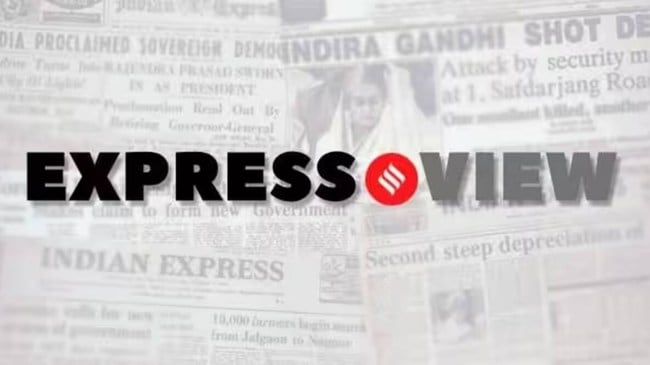Opinion Express view on free movement in Manipur: Mistrust must be addressed
The government must prioritise large-scale outreach and confidence-building efforts
 Restoring the normal functioning of highways is imperative for Manipur’s return to normalcy, but this will also need a wider consultation with all stakeholders.
Restoring the normal functioning of highways is imperative for Manipur’s return to normalcy, but this will also need a wider consultation with all stakeholders. The ongoing ethnic conflict in Manipur has resulted not only in mass displacement and the deaths of hundreds of people, but also a disturbing segregation of the Meiteis and the Kukis, so much so that neither community can venture outside their respective zones of dominance. Over the past 22 months, several incidents of violence have taken place when people from one community accidentally crossed into the other’s territory. Manipur has been living with the looming spectre of partition, complete with buffer zones guarded by central forces. Against this backdrop, Union Home Minister Amit Shah’s recent call for unrestricted movement across Manipur, effective from March 8, was a welcome attempt to reverse the segregation. The plan involved government-arranged buses running between the hills and the valley, escorted by central forces. However, the fragility of the situation was underscored when a person was killed on the very first day of the implementation — marking the first casualty in four months and breaking the uneasy calm that had prevailed in most parts of the state since the escalation in November last year in the districts of Imphal West, Bishnupur and Jiribam. The incident has underlined the challenge of peace that everybody, citizens and the state, must step up to.
The NH-2 and NH-37 highways serve as the lifelines of the state, enabling the movement of goods and personnel between the valley and the hills. Kuki groups have used economic blockades along these highways to press their demands for a separate administration. This has caused food shortages, inflation and business disruptions in the valley. Meitei groups too have attacked supply trucks headed towards the hills. The home minister’s plan was aimed at resolving this particular point of friction. But on March 8, while a bus from Imphal to Churachandpur successfully completed its journey, another travelling through Kangpokpi district was met by large crowds of protesters clashing with security forces. The protesters opposed what they perceived to be the Centre’s diktat without first adequately addressing the concerns of tribal communities. The incident leaves no doubt that Manipur is still far from a return to normalcy. While the resignation of Chief Minister N Biren Singh leading to President’s Rule was a much-needed if belated step, it needs to be followed by other measures to prevent a backsliding.
Restoring the normal functioning of highways is imperative for Manipur’s return to normalcy, but this will also need a wider consultation with all stakeholders. Twenty-two months later, Manipur remains deeply fractured, with ethnic tensions shaping daily life. The violence sparked by the free movement initiative reflects the profound mistrust that continues to exist between both communities. The government must, therefore, prioritise large-scale outreach and confidence-building efforts. Governor Ajay Kumar Bhalla took an initial step forward by urging extremist groups to surrender weapons. Even though only a fraction of the arms and ammunition were surrendered, this effort must be expanded to foster meaningful engagement between the Meiteis and Kukis, to lay a foundation for an enduring reconciliation.






